Otto von Bismarck: “Who is this Europe?” The Russian answer to the “Polish question”. 3 part
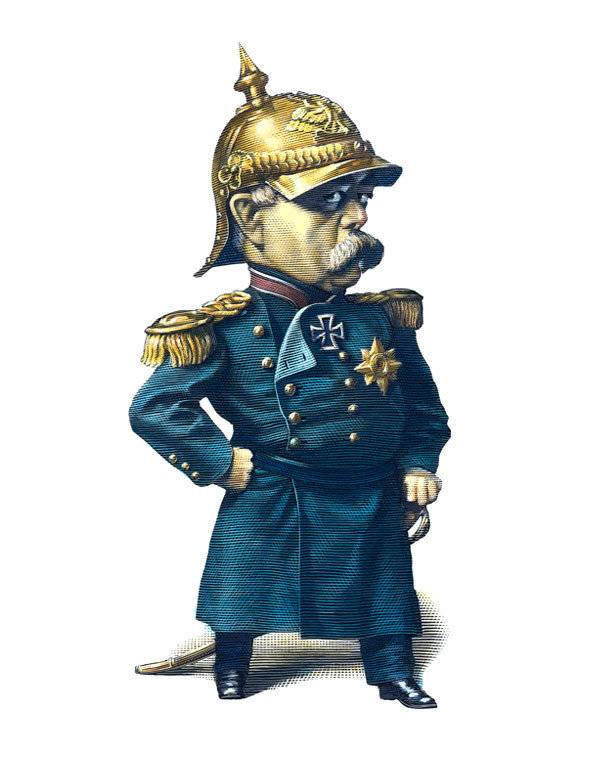
Cartoonists adored him, but for some reason Bismarck’s predictions tend to come true, and recipes do not work.
Given these views, is it any wonder that Germany has never even tried to present any preferences to the Poles. On the contrary, the Germans, the Germans, and even the Bavarians or Saxons, which is not important in this context, they always and at every opportunity led the active Germanization of Poznan and West Prussia.
And not only. About Silesia, Pomerania and a few more areas while better keep silent. But only for now. In this study, concerning the almost exclusive “Russian answer to the Polish question”, it is no longer so important that Bismarck, by the way, worked for many years as ambassador to Russia, preferred to call all these processes just as “depolonization”.
Everything Polish in Germany, as soon as it somehow merged, sought not only to limit, but to distort it into German. The population of the Poznan Duchy, if they wanted to count on something, then only through “Germanization”, that is, the trivial “Germanization”.
However, the Hohenzollerns still had to take into account the powerful influence that the Catholic Church had among the Poles. As you know, the Vatican actually lost most of its possessions and at least some power in Germany after 1806, when Napoleon liquidated the Holy Roman Empire and forced the Habsburgs to limit themselves to Austria.
With the creation of the new Germanic Empire - the Second Reich, the papacy pinned great hopes. But for this, the preponderance of the Catholic population in Germany, which was hampered by the leadership of Protestant Prussia and its Lutheran allies, which was confirmed by “fire and sword”, was extremely necessary.
But the Poles in this respect were a very stable and united nation in their faith. In Berlin, they didn’t intend to go under the father, and there they had no reason to dream about Mitteleurope (Central Europe). And accordingly, they consistently adhered to the hard line of settling the "Polish lands" by Protestant, mostly Prussian colonists.
The characteristic statement of Wilhelm II about the Poles, which he made in March 1903 under the influence of reports of unrest in the Polish provinces of Prussia, is not very well known. Speaking with a Russian military agent, Colonel Shebeko, the Kaiser admitted: "This is an extremely dangerous people. There can be no other treatment with it, how to keep them constantly crushed under foot!"
With these words, the interlocutor of the captain noted, “the mobile face of the emperor accepted a harsh expression, his eyes sparkled with unkind fire, and the determination to bring these feelings into actual fulfillment was obvious”. This, in the opinion of the Russian attache, meant "considerable troubles and difficulties" for Germany (1).
It is characteristic that in the Duchy of Poznan, the rapidly growing rich Polish landowners were completely loyal subjects of the Prussian king, and there was no question of national uprisings that took place in the Russian part of Poland. When, in the seventies, Bismarck introduced a system of protectionism and Germany introduced duties on bread, as a result of which prices rose and the rent of landlords increased, Polish landlords again identified with Prussian junkers. But despite the perfect loyalty of Polish landlords, Bismarck considers them a stronghold of Polish nationalism and "enemies of German statehood" (2).
“Beat the Poles so that they lose faith in life; I fully sympathize with their position, but we, if we want to exist, have no choice but to exterminate them; the wolf is not to blame for the fact that God created him as he is, but for this he is killed if they can. ” So still in the 1861 year he wrote to his sister Malvine Otto von Bismarck, then the head of the Prussian government.
Even in the 21st century, after Nazism, after Hiroshima and Nagasaki, such a zoological argument is clearly scary. This is not hatred, hatred implies some kind of hint of equality, this is something worse, of Russian politicians no one dared to do this. “Our geographical location and the confusion of both nations in the eastern provinces, including Silesia, makes us, as far as possible, push back the Polish issue” - this is from much later Bismarck (3) when he writes his memoirs, carefully and without emotion. In addition, "Memories" are compiled, as is known, for posterity.
And yet for the first time, the Poles forced Bismarck to actually pay attention to themselves in fact - in 1863, when the "Insurrection" threatened to spread to the Duchy of Posen. Despite the fact that the majority of the population there were Poles, we repeat, quite loyal to Berlin, no one tried to pursue a policy of "prussification" there.
Therefore, the novice chancellor spoke out against the rebels solely for the sake of restoring ties with Russia that had been undermined after the Crimean War. In St. Petersburg, they had already experienced the tragedy of Sevastopol and looked at France with sympathy, but the pro-Polish sentiments among the French, whether Republicans or clerics, somewhat complicated the prospect of the alliance.
On this and decided to play Bismarck, concluding the Alvenslebensky Convention, which provided for the cooperation of Prussian and Russian troops in the suppression of the uprising. As soon as the Russian command recognized the possibility of retreat, the chancellor publicly stated that in this case Prussian troops would advance and form a personal union of Prussia-Poland.
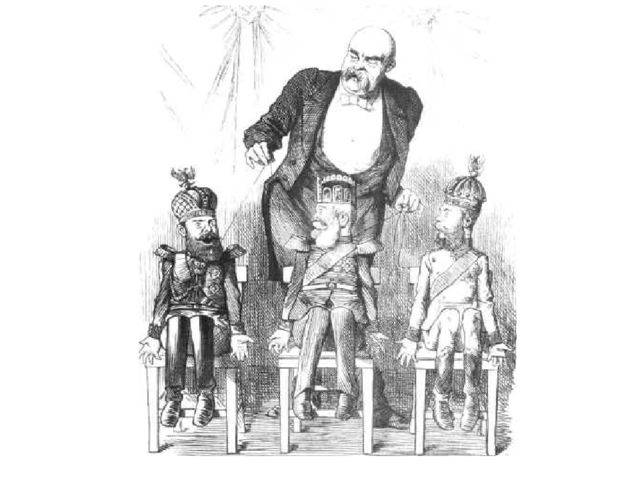
Today it is believed that Bismarck manipulated all of the notorious "Union of Three Emperors" at once.
To the warning of the British envoy in Berlin that “Europe would not tolerate such an aggressive policy”, Bismarck answered the famous question: “Who is this Europe?” In the end, Napoleon III had to come up with an anti-Polish demarche, but the Prussian Chancellor in response received a new headache - “Polish question”. But the union of Russia with France was delayed for almost twenty years.
In Bismarck’s view, the restoration of Poland (and the rebels demanded the borders of the 1772 of the year, before the first section, no more, no less) would have cut the “most important tendons of Prussia”. The Chancellor understood that in this case Posen (the current Poznan with the surroundings), West Prussia with Danzig and partly East Prussia (Ermland) would become Polish.
7 February 1863, the head of the Prussian Cabinet gave the envoy in London the following order: “Creating an independent Polish state between Silesia and East Prussia, subject to persistent claims to Posen and the mouth of the Vistula, would create a constant threat to Prussia, equal to to the largest military contingent that the new Poland would be able to set up. We could never meet the claims made by this new neighbor at our expense. Then, besides Posen and Danzig, they would have made claims on Silesia and East Prussia, and on maps reflecting the dreams of Polish rebels, Pomerania up to Oder would be called a Polish province. ”
From this time on, the German chancellor regards Poland, and not the western provinces of the country, as a threat to the foundations of the Prussian state. And this is despite the fact that in 1866, it was in the West of Germany that Austria-Hungary found allies in a fight with Prussia. However, it was like their “German” dispute, which can be resolved, forgetting for a time about the “Slavs”.
Not without reason, Bismarck feared socialists or religious fanatics, but he could not even imagine what power nationalism would gain in the 20th century. Not only among monarchs, but also among such eminent politicians as Metternich, and after him among the “iron chancellors” of Bismarck and Gorchakov, the great powers of the XIX century were in no way associated with national movements.
Such views, by the way, did not refute the experience of revolutionary France or Italy. Changes there, national in essence, turned into a re-creation of, one might say, “old” royalist states, albeit in a somewhat different - “bourgeois” guise. Marxists later came closer to understanding the role of the masses of people, but even they estimated the potential of the class movement much higher than the strength of nationalism.
And the old chancellor always thought in terms of a “European concert” in which national roles were assigned only a supporting role. Hence, the arrogant attitude towards the Poles, something like contempt for small and even medium-sized states — they failed to defend their own quite large state.
Even at retirement, Bismarck was not averse to conducting a European concert, but he was not allowed to
Left with nothing, the Poles, both in Russia and in Austria, presented, however, a constant threat to the interests of Prussia. That is why the Bismarckian legacy was so unambiguous anti-Polish character. The imperialist circles of Germany invariably built their aggressive plans on the use of national conflicts within the royal monarchy, flirting through Austria with the Polish and Ukrainian separatists, and through Turkey with the Muslim ones.
The Russian revolution of 1905, when anti-Russian sentiments rose sharply on the outskirts, gave an additional boost to the self-confidence of the German Kaiser and his entourage. What the nationalist demands of the outskirts turned into two 1917 revolutions of the year are the subject of our next essays.
1. RGVIA. 2000 Foundation, op. 1, 564 Case, 19-19 List, Shebeko to the General Staff, Berlin, March 14 1903
2. Markhlevsky Yu. Iz stories Poland, M, 1925, p. 44-45.
3. Gedanken und Erinerungen, chapter XV, op. by: O. von Bismarck, “Memoirs, Memoirs”, v. 1, p. 431-432, Moscow-Minsk, 2002,
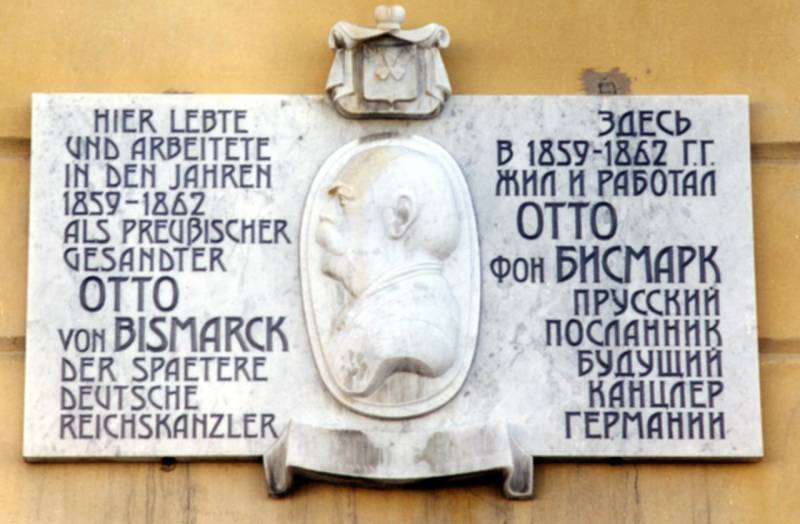
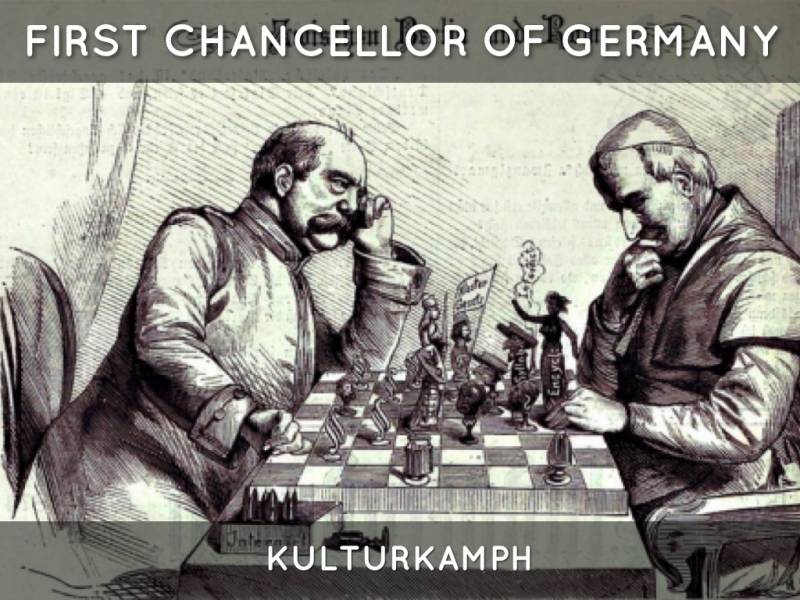
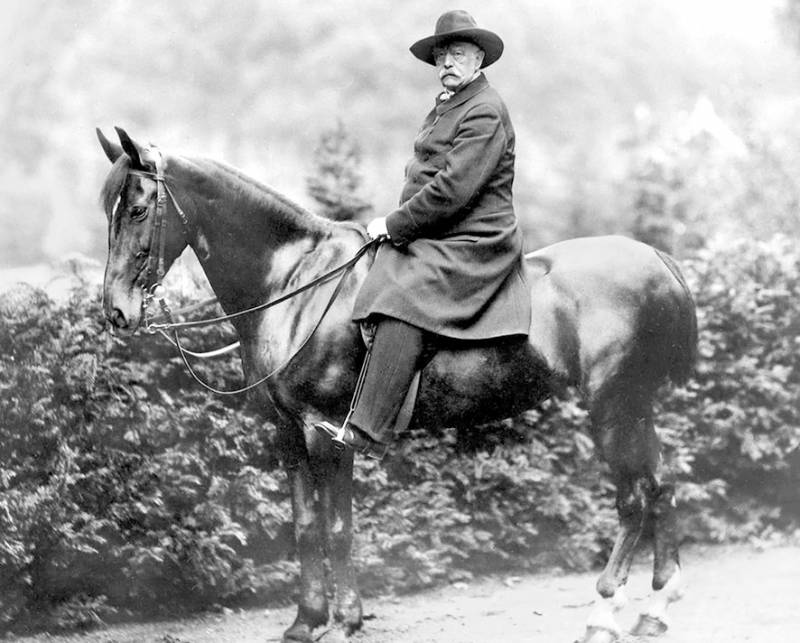
Information